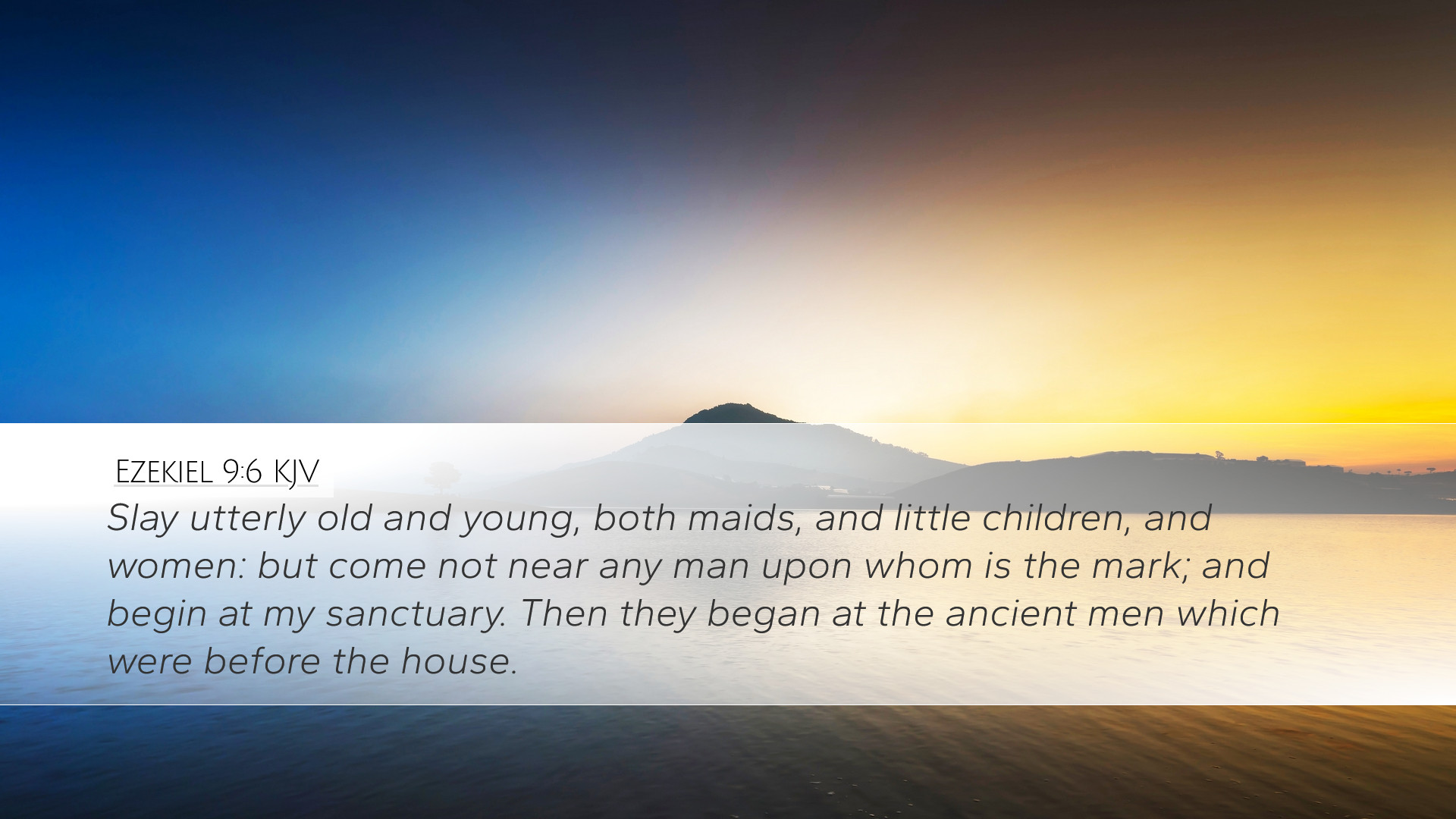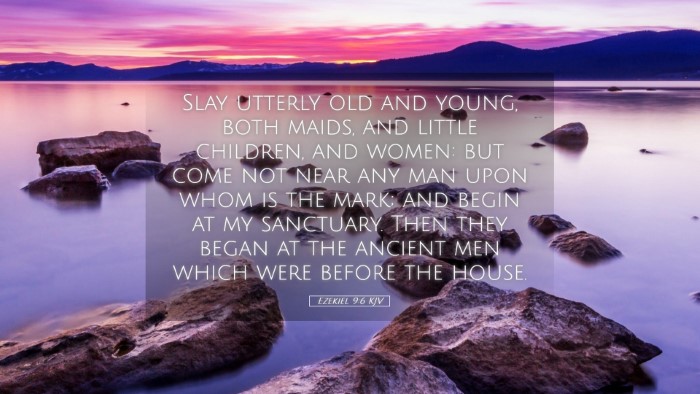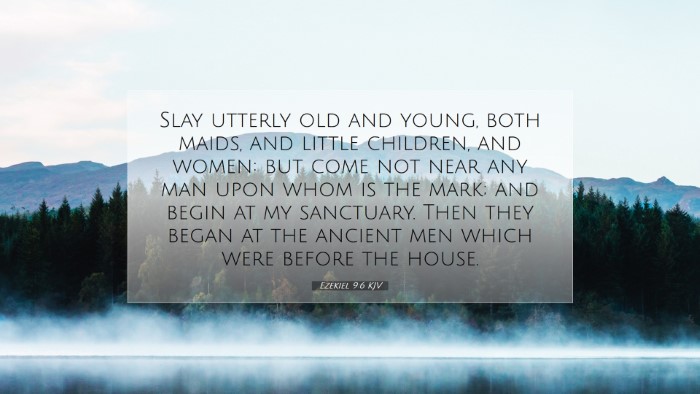Ezekiel 9:6 Commentary
Verse Context: Ezekiel 9:6 states, "Slay utterly old and young, both maids, and little children, and women: but come not near any man upon whom is the mark; and begin at my sanctuary. Then they began at the ancient men which were before the house."
Introduction
This verse appears within a broader prophetic vision given to Ezekiel, wherein God commands the execution of judgment upon the inhabitants of Jerusalem for their transgressions. The verse is stark and unsettling; it speaks of divine judgment that extends to all ages and genders, yet it introduces the concept of a "mark" indicating those who will be spared from destruction. This commentary will explore the implications of this verse based on insights from various public domain commentaries.
Understanding God’s Judgment
Matthew Henry's Commentary: Matthew Henry emphasizes the seriousness of God's judgment. He notes that the command to "slay utterly" is not merely a call to physical destruction but symbolizes the complete removal of evil from God's people. The phrase calls attention to the severity with which divine justice must be executed, reflecting God's holiness in dealing with sin.
Albert Barnes' Notes: Albert Barnes affirms the seriousness of God's judgment, particularly when he notes that "begin at my sanctuary" indicates a starting point where the greatest accountability lies—among those entrusted with leadership and spiritual oversight. This remark suggests that the leaders, due to their roles, must face scrutiny first, which serves as a warning to those in positions of authority.
Adam Clarke's Commentary: Adam Clarke provides insight into the nature of God's retribution. He suggests that the phrase "slay utterly" underlines the totality of God’s judgment. Clarke posits that the gravity of the punishment on various groups—men, women, children—emphasizes that all are implicated in the collective transgressions of the society. Disobedience to God has an all-encompassing consequence.
The Mark of Deliverance
The Importance of the Mark: A crucial aspect of this verse is the "mark" mentioned, which signifies divine protection. The individuals who bear this mark are spared from the impending destruction. This aspect of the narrative resonates profoundly with the themes of grace and mercy amid judgment. The marking serves as a metaphorical defense against the judgment due to their faithfulness to God.
Matthew Henry's Insights: Henry mentions that the mark signifies the believers or the righteous. He indicates that God always has a remnant that He preserves, and this act should encourage faithful individuals during times of distress and moral decline. The assurance that God recognizes and protects His faithful ones gives hope even in dire circumstances.
Albert Barnes on the Mark: Barnes adds that this mark is representative of the righteous actions and faith of those being spared. The clear distinction made between those who are marked and those who are not underscores a fundamental biblical principle that God seeks those who pursue righteousness amidst corruption.
Divine Order in Judgment
The command to "begin at my sanctuary" illustrates a divine order in executing judgment. This prioritization highlights that those closest to God—His people and leaders—are held to a stricter standard. This principle remains relevant across ages, calling into question the spiritual condition of leaders today.
Adam Clarke's View: Clarke states that the execution beginning at the sanctuary serves as God's method of purifying His people. It is intended to signify the seriousness of responsibility that comes with leadership in spiritual endeavors. Those leading others can expect God's scrutiny to be particularly rigorous, reminding us of the need for authenticity in spiritual leadership today.
Theological Implications
This passage raises significant theological implications regarding judgment, grace, and human accountability. It serves as a thought-provoking reminder that God’s judgment has both immediacy in the present efforts to correct waywardness and a future consideration regarding ultimate accountability before Him.
Moral Accountability: Each individual, regardless of culture or time period, is called to reflect on their standing before God. The starkness of this judgment narrative serves as an urgent exhortation for all believers to seek personal holiness and to be conscientious in promoting justice and righteousness within their spheres of influence.
Pastoral Reflections
For pastors and church leaders, the implications of Ezekiel 9:6 are profound. The weight of responsibility in leading God's people cannot be overstated. This scripture serves both as a warning and an encouragement. Pastors must engage in self-examination, ensuring that their actions align with their teachings and reflect God’s desires.
Furthermore, the concept of the mark offers solace and hope to believers, assuring them that fidelity to God in times of moral decay will not go unnoticed. Pastors may find that preaching on such topics can encourage congregations to strengthen their faith, trust in God’s protection, and pursue righteousness actively.
Conclusion
In conclusion, Ezekiel 9:6 stands as a powerful reminder of God's holiness and the seriousness of His judgment, while also illuminating the themes of mercy and deliverance through the mark of protection. It's a call to introspection for individuals and communities alike, urging a return to diligence in faith, leadership's accountability to God, and the need for repentance in a world rife with moral decay. The insights provided by commentaries from esteemed theologians like Matthew Henry, Albert Barnes, and Adam Clarke furnish the biblical text with rich understanding, making it valuable for pastors, students, and scholars alike as they navigate the complexities of faith in service to their communities.


